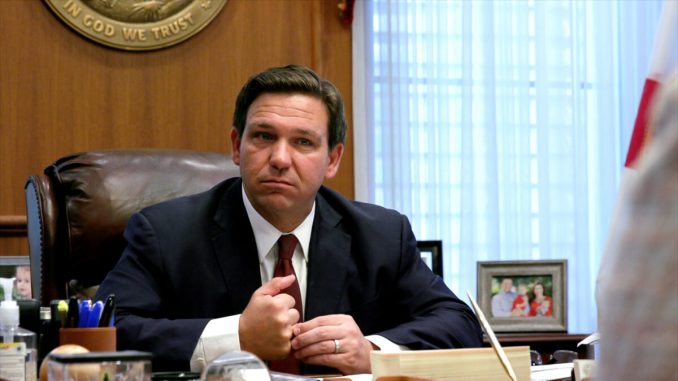

Florida’s Republican Gov. Ron DeSantis said the lawsuit his state filed against the Biden administration over its early immigration decisions is seeking to compel the federal government to “actually follow the law.”
“The lawsuit seeks to have them actually follow the law, follow the Constitution. Maria, you will hear excuses for why they don’t enforce immigration laws in certain instances, prosecutorial discretion, focus on the most threats,” DeSantis told Fox News’ Maria Bartiromo on Sunday.
“These are the most threatening folks. They are criminal convicted aliens. And they are not even doing that. You cannot totally default on your responsibility to enforce the law under the Constitution.”
State Attorney General Ashley Moody announced Florida’s lawsuit in early March, arguing that the series of new rules narrowing the administration’s immigration enforcement priorities dubbed “interim enforcement priorities” jeopardized the safety of Floridians as well as illegal immigrant victims.
These priorities include narrowing immigration enforcement to three categories: individuals who have been engaged in or suspected of terrorism or espionage; immigrants who crossed into the United States illegally on or after Nov. 1, 2020; and individuals convicted of an “aggravated felony.”
The guidelines were established by two memoranda—known as the Jan. 20 memo and Feb. 18 memo—that modified the way federal immigration and other law enforcement agencies would operate.
The first memo (pdf) was issued on Jan. 20 and acted as interim guidelines for DHS agencies to follow while a review of policies and practices concerning immigration enforcement took place. The guidelines essentially focused all enforcement actions to the three categories, as well as issue a 100-day pause on deportations.
At the time, the department justified its decision by saying that “DHS cannot respond to all immigration violations or remove all persons unlawfully in the United States” due to limited resources.
The second memo (pdf) was issued on Feb. 18 as additional guidance to the Jan. 20 memo and also required ICE officers to obtain pre-approval from managers to arrest some illegal immigrants if they do not fall within the three categories. The Feb. 18 memo is expected to last for three months after which DHS Secretary Alejandro Mayorkas is expected to issue new enforcement guidelines for the department.
“By focusing our limited resources on cases that present threats to national security, border security, and public safety, our agency will more ably and effectively execute its law enforcement mission,” ICE Acting Director Tae Johnson said in a statement at the time.
DeSantis characterized the policy changes as “reckless.”
“Normally, when we’d have a criminal alien, convicted of a felony, they obviously served their sentence in Florida state prison. And prior to the Joe Biden administration, ICE would take control of them when they finish their sentence and remove the criminal alien and send them back to the home country,” he said.
“That should be like clockwork. That is the biggest no-brainer there is.”
He also expressed concern that, due to the memos, the administration is no longer honoring ICE detainers and that criminal aliens are being released into the community.
Other states have since filed lawsuits against the Biden administration over the two memoranda. In early April, attorneys general from Texas and Louisiana took the Biden administration to the court alleging that it is refusing to take custody of illegal immigrants convicted of serious crimes.
The attorneys general argue that the memoranda failed to prioritize detention of criminal aliens with final orders of removal, criminal aliens convicted of drug offenses, or criminal aliens convicted of crimes of moral turpitude.
The result of implementing the two memoranda, the lawsuit argues, has led to the U.S. Immigration and Customs Enforcement (ICE) rescinding detainer requests related to incarcerated criminal aliens, not issuing detainer requests for illegal aliens subject to mandatory removal, and the release of such individuals from federal detention facilities in Louisiana and Texas.
The 100-day suspension on deportations order has been blocked by a federal court indefinitely after Texas Attorney General Ken Paxton sued the administration. The judge found that the Lone Star state would be harmed by the moratorium.






Be the first to comment